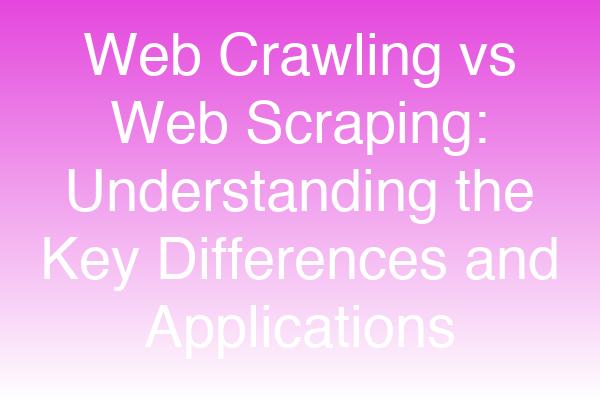
Categories: Data Science, Web Development, SEO
Tags: web crawling, web scraping, data collection, SEO, digital marketing, web automation, data analysis
Introduction
In the digital age, data is the new oil, and understanding how to effectively gather and utilize this data is crucial for businesses and developers alike. Two fundamental techniques in the realm of data collection are web crawling and web scraping. While they may sound similar, they serve distinct purposes and employ different methodologies. In this article, we will delve into the nuances of web crawling vs web scraping, exploring their definitions, applications, and the implications they have for data-driven decision-making.
What is Web Crawling?
Web crawling is the process by which automated bots, known as crawlers or spiders, systematically browse the internet to index content from web pages. This is a crucial function for search engines like Google, Bing, and Yahoo, as it allows them to gather information about websites and their content to provide relevant search results.
Key Characteristics of Web Crawling:
- Purpose: To index content for search engines.
- Methodology: Automated bots follow links from one page to another.
- Output: A comprehensive index of web pages.
- Frequency: Regularly scheduled to keep the index updated.
What is Web Scraping?
Web scraping, on the other hand, refers to the extraction of specific data from web pages. This technique is often used by businesses and developers to gather information for analysis, research, or competitive intelligence. Unlike web crawling, which focuses on indexing, web scraping zeroes in on particular data points.
Key Characteristics of Web Scraping:
- Purpose: To extract specific data for analysis.
- Methodology: Targeted requests to retrieve data from specific web pages.
- Output: Structured data sets (e.g., CSV, JSON).
- Frequency: Can be one-time or scheduled based on needs.
Web Crawling vs Web Scraping: A Comparative Table
| Feature | Web Crawling | Web Scraping |
|---|---|---|
| Objective | Indexing web content | Extracting specific data |
| Tools Used | Search engine bots (e.g., Googlebot) | Scraping tools (e.g., Beautiful Soup, Scrapy) |
| Data Format | Unstructured index | Structured data (tables, CSV, JSON) |
| Legal Considerations | Generally accepted | Must comply with website terms of service |
| Use Cases | Search engine optimization, SEO | Market research, price comparison |
Applications of Web Crawling
Web crawling plays a vital role in various applications, including:
- Search Engine Optimization (SEO): Helps search engines index pages effectively, improving visibility.
- Content Discovery: Assists in finding new content for news aggregators and content curation platforms.
- Data Analysis: Provides a foundation for analyzing trends and patterns across the web.
Applications of Web Scraping
Web scraping is widely used across industries for various purposes, such as:
- Market Research: Gathering competitor pricing and product information.
- Lead Generation: Extracting contact information from websites.
- Sentiment Analysis: Collecting reviews and social media data for brand monitoring.
Expert Insights
According to Dr. Jane Smith, a data scientist at Tech Innovations Inc., “Understanding the difference between web crawling and web scraping is essential for businesses looking to leverage data effectively. Each technique has its unique strengths and applications.”
Additionally, John Doe, a digital marketing strategist, states, “While web crawling is crucial for SEO, web scraping can provide invaluable insights into market trends and consumer behavior.”
Common Questions About Web Crawling and Web Scraping
Is web scraping legal?
- It depends on the website's terms of service. Always check before scraping.
Can web crawlers be blocked?
- Yes, websites can use robots.txt files to control crawler access.
What tools can I use for web scraping?
- Popular tools include Beautiful Soup, Scrapy, and Octoparse.
Conclusion
In summary, while web crawling and web scraping are both essential techniques for data collection, they serve different purposes and methodologies. Understanding these differences can empower businesses and developers to make informed decisions about how to gather and utilize data effectively. Whether you are optimizing your website for search engines or extracting valuable insights from competitors, knowing when to use each technique is key.
Call-to-Action
Ready to harness the power of data for your business? Contact us today to learn how our data collection services can help you gain a competitive edge!
Social Media Snippet:
🚀 Dive into the world of data with our latest article on web crawling vs web scraping! Discover the key differences and how they can benefit your business. #DataScience #WebScraping #SEO
Suggested Internal Links:
- The Importance of SEO in Digital Marketing
- Top 5 Tools for Data Analysis
- How to Optimize Your Website for Search Engines
Suggested External Links:
FAQs
What is the main difference between web crawling and web scraping?
- Web crawling is about indexing web pages, while web scraping focuses on extracting specific data.
Can I use web scraping for competitive analysis?
- Yes, web scraping is commonly used to gather competitor data for analysis.
What are some ethical considerations for web scraping?
- Always respect the website's terms of service and robots.txt file, and avoid overwhelming the server with requests.
This blog post provides a comprehensive overview of web crawling vs web scraping, ensuring readers leave with a clear understanding of both concepts and their applications.